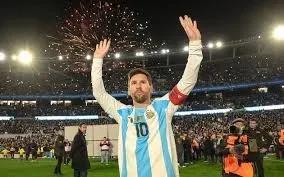What no Argentine knew was going to happen but never wished it would happen began to happen: Lionel Messi said goodbye to the country in a points game. After twenty years, the Rosario native embodies the final chapter of the most beautiful story of all where the 2026 World Cup would be his last dance, show, performance, or whatever you prefer to call it. And it didn't seem like twenty years had passed, 194 matches, 114 goals, 65 assists, and five titles under his belt (highlighting the 2022 World Cup), as he once again became key by contributing two goals and building the play for the 2-0. He played with the same sacred fire that he carried throughout his career, the one that made him the best footballer of all time and fulfilled all his dreams.
However, the document says he is already thirty-eight years old despite playing like one of twenty-five. Age takes its toll like any human being (even though on the field he is an extraterrestrial) and those minor injuries that can cause fatigue prevent him from playing constantly and for that reason, he will not be playing against Ecuador next Tuesday. No one wants to acknowledge his age nor that the end is approaching, but the captain hinted that only the last grains of sand are left in the hourglass.
A complicated path
At eighteen years old, Messi began his story with the national team against Hungary, the exact same rival that Maradona debuted against. The comparisons and similarities were just beginning, but his debut was somewhat complicated. Fifty seconds after entering, he received a pass from Scaloni, and while grappling with a rival, he ended up brushing his neck. The referee misinterpreted it as an elbow and issued a direct red card. From the first minute, they made him understand that he had to fight a lot to achieve the dream career.
In Germany 2006, despite performing well in that Cup, standing out with a goal and an assist in the rout against Serbia, he watched the elimination against the hosts from the bench, gnawing on a lot of anger. Again, they marked the field for him, but with the expectation that he would return Argentina to glory.
The arrival of Maradona on the bench generated a lot of expectations as it was hoped he would pass all his secrets to his heir for South Africa, but nothing could have been further from reality. The national team entered the World Cup through the back door, and Lionel did not score in the top competition due to bad luck with posts.
Cynical criticism started to emerge from a large part of the press and a minority of fans, but they were audible. The contrast between his feats in Barcelona, where he was unstoppable and broke all records known, and the scarcity of titles in the local arena was notable. Additionally, there was the constant odious comparison with Maradona, who had reached glory in 1986 and quickly became deified. Two different styles of leadership, where “Pelusa” showed more to the camera with shouts, demands, and singing the National Anthem passionately while insulting those who whistled.
Messi, quiet as usual, accepted that enormous burden every time he crossed the Atlantic to come defend the country. Coaches lost on the field, teammates who couldn't keep up with him, and forwards missing incredible goals at crucial moments created a massive “Messi-dependence” and lit up warnings for him to cover all their mistakes. The painful final against Chile in 2016, the third final in three years, and the leading media treating him as the main guilty made him say “enough. It's over. This isn't for me.”
The genuine fan did not allow his idol to give up. That man who insisted on continuing to try could not concede defeat and leave the national team without becoming a champion. A torrential downpour did not prevent thousands of Argentines from gathering at the Obelisk a few days after the resignation. Young and old asked him to rethink his decision, that his dribbles continue to be dyed with sky blue and white, that love for the country could overcome the hate of a few, but above all, that life would give him the gift he deserved more than anyone. This and thousands of displays of affection made Messi reconsider his position, and in a press release, he stated that many things needed fixing in Argentine football, but the only way he could do it was on the field. He acknowledged that many things had gone through his mind after the last final, but that he “loved the country and the jersey too much.” He would try again as many times as possible, despite many considering him the main culprit for the long drought that Argentina was experiencing in terms of achieved laurels.
Since his return, he already seemed different. He remained the same magician with his feet as ever, but he was a fierce Messi, never seen before. He appeared more active in directing on the field, confronted rivals, and especially, constantly criticized referees for controversial decisions that harmed the team both on and off the field. While Russia 2018 was a more than forgettable memory, everything was going to change the following year.
The resilience of the little giant / prophet in his land
With Scaloni in charge, the coaching staff made the decision for a total renewal. It didn’t matter so much to be among the best in the world, but to run until the last second for the jersey. Players like De Paul, Paredes, Dibu Martínez, among others, who grew up watching Messi constantly attempt to bring a title to the country, understood that they had to die for their captain. They needed to stop playing for the Ten and play with him, at his pace to break the bad streak.
The team went from strength to strength in the 2019 Copa América, but in the collective memory, there was an angry Messi against Conmebol calling them corrupt after the controversial semifinal against Brazil. The team made a click. If their captain rebelled against the great corporations of football, everyone had to follow him, and anyone who touched him or the team lit the dynamite on the field.
With that sacred fire, Argentina had its revenge in 2021 against its eternal rival, winning 1-0 and ending the twenty-eight-year curse without a championship. The final whistle not only sealed a victory: it opened a rift in time and closed it for Argentines. Messi, kneeling on the grass, broke down in tears that were relief, release, and eternity. He cried for all the lost finals, for the criticisms he had carried in silence, for that jersey that had always been his second skin, and for that country, which, despite living his whole life in Barcelona, he always carried in his heart. Then, one by one, his teammates ran towards him to embrace him collectively, as if an entire country wanted to hold him in that moment. And in those tears, all of Argentina found a mirror: the certainty that the wait had been well worth it.
He had already finished with the criticisms, the stadiums would cheer for him, and they revered him like a God every time he touched the ball. “That, with the hand of Leo Messi, we will go around” was a song of hope. But the little giant wanted more: the World Cup. He was 35 years old and knew that very tough rivals awaited him physically, but the hero carried with him a team, an entire nation that breathed and dreamed more than ever.
The final against France was an epic duel. Messi arrived as the lighthouse of his selection: the best of the Cup, last-minute goals, and assists that seemed to invent time. Each of his touches carried the hope of millions; each run was a declaration of love for the game. As the Cup approached, the minutes stretched, and hearts beat in time with his dribbles. And when Montiel scored the decisive penalty, the little giant fell to his knees again, this time embraced by his entire team and by a nation that could finally see its dream turned into history. “It's done. It's done,” he told his family who was in the box. A “it's done” very different from the one he proclaimed in 2016 after the frustration of having lost four finals and receiving so much yellow journalism criticism. Almost at the end of his career, he had just been sanctified. Finally, he completed his journey of being a prophet in his own land.


Comments